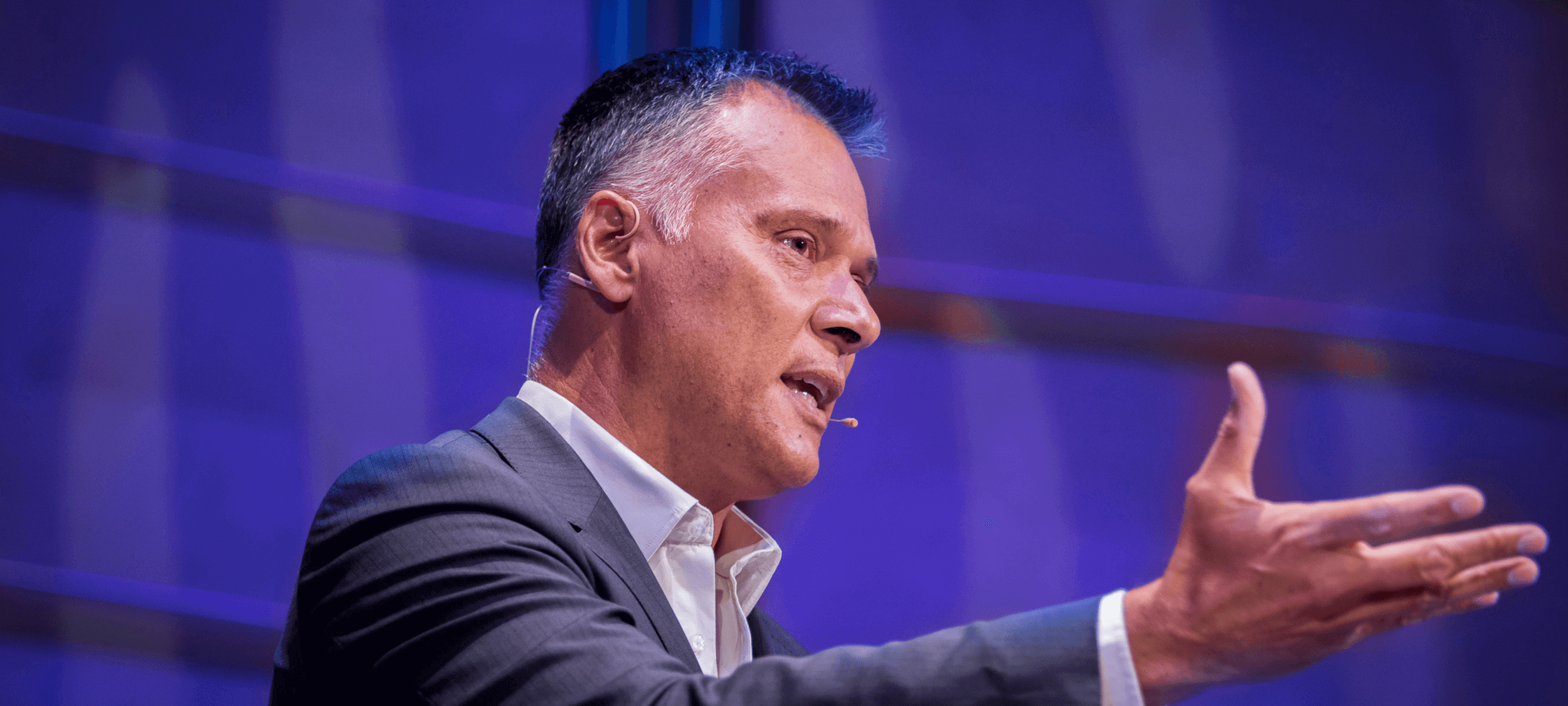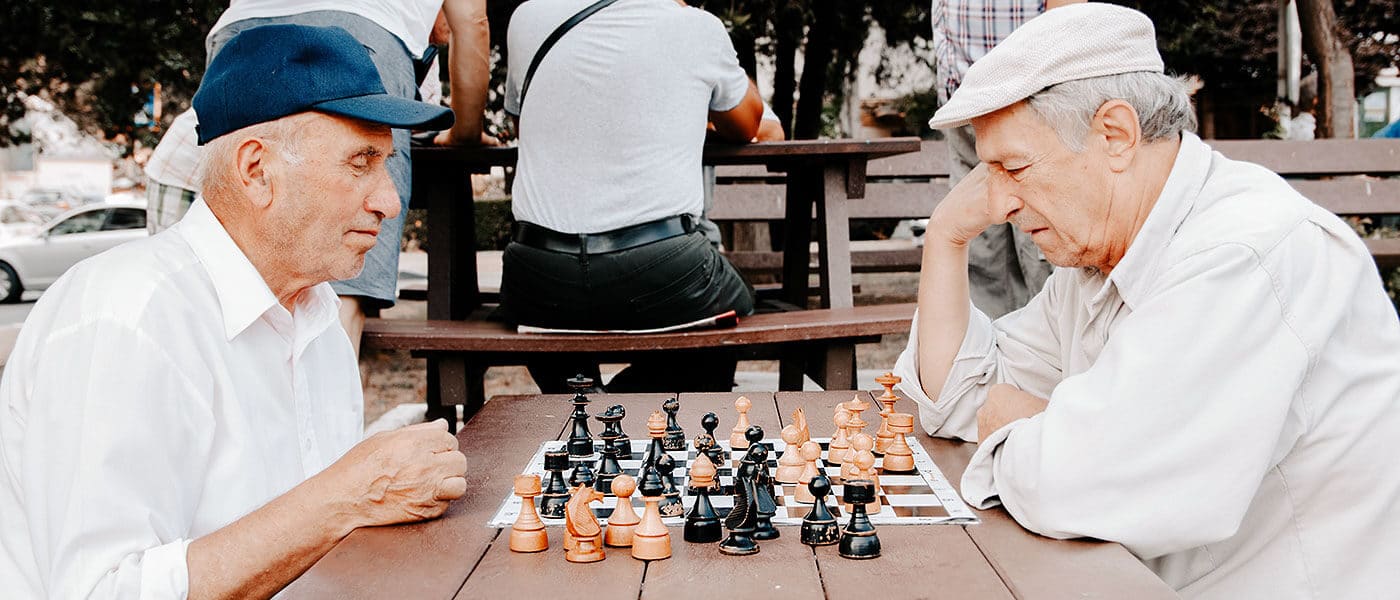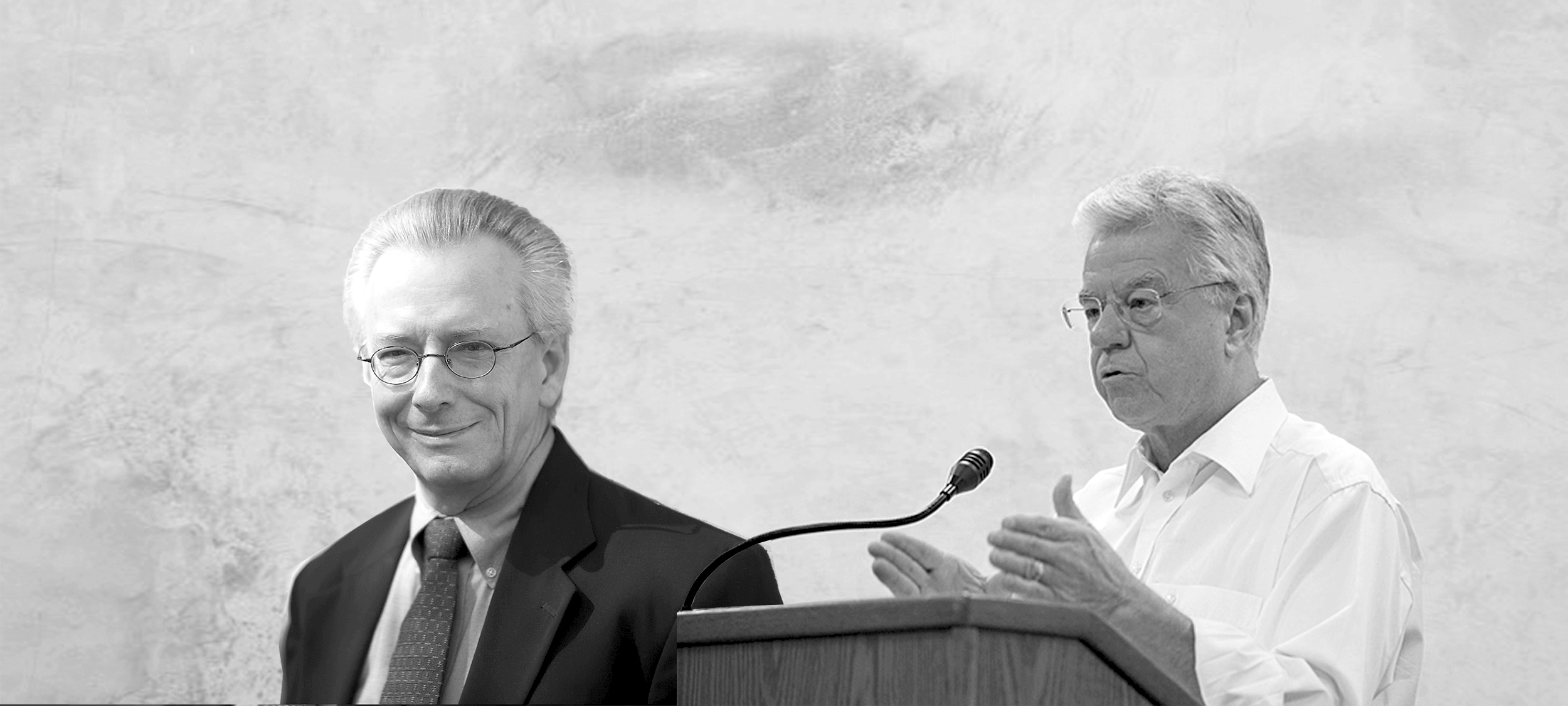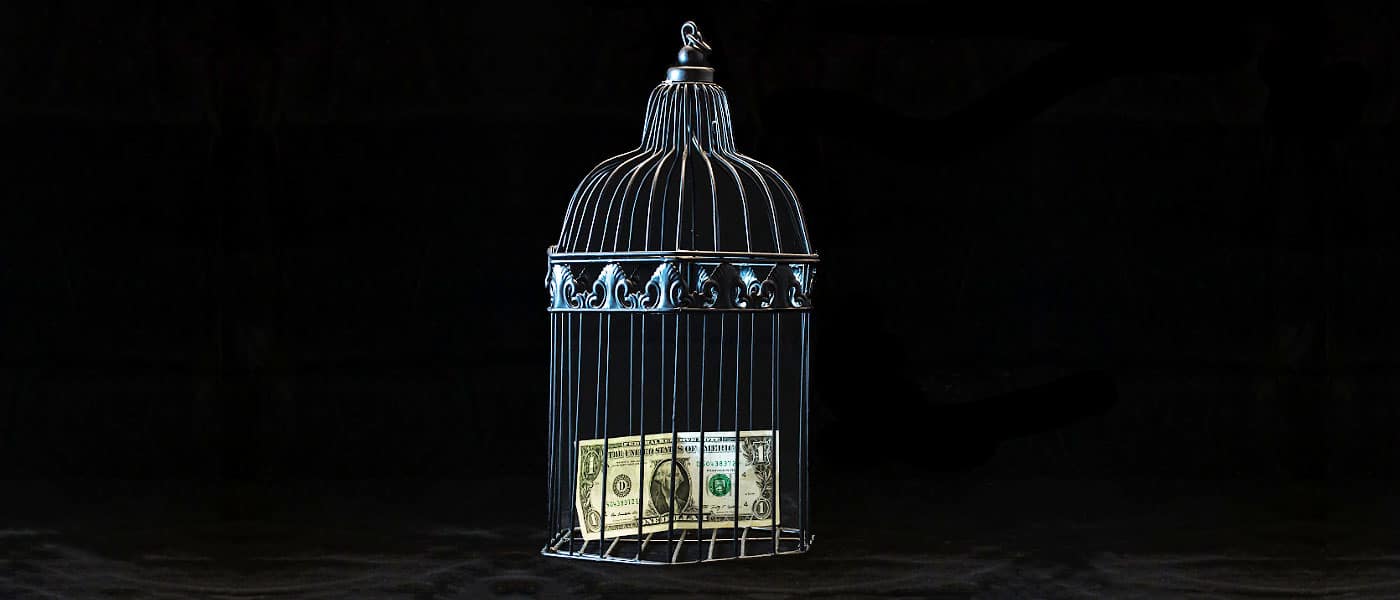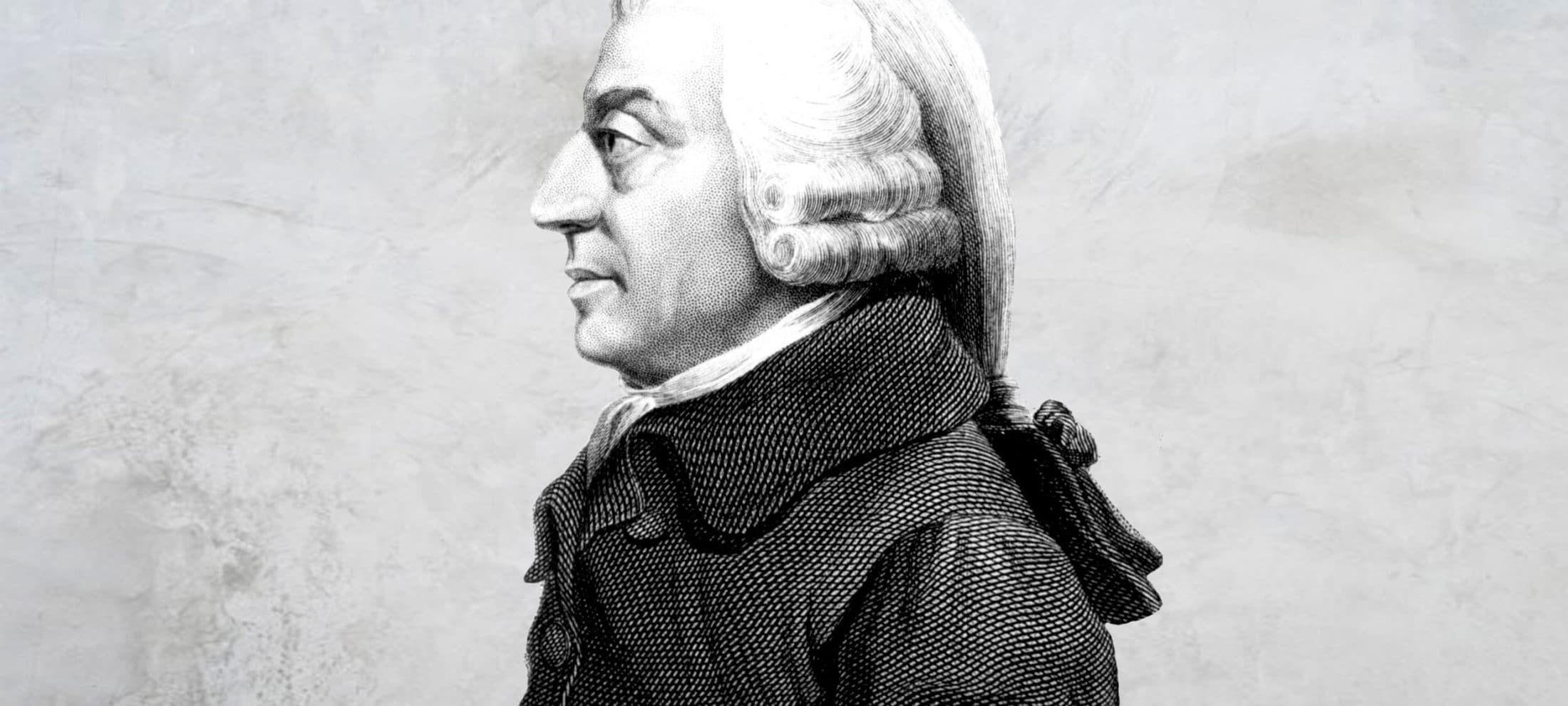Stan Grant: racism and the Australian dream
On the IQ2 stage in 2015, Stan Grant opened the hearts and minds of the audience with his powerful speech on racism in Australia.
The IQ2 debate, ‘Racism is Destroying the Australian Dream’ was a finalist in the United Nations Media Peace Awards for its role in stimulating public awareness and understanding. Stan’s iconic talk continues to move and inspire millions.
COMPLETE TRANSCRIPT
“Thank you so much for coming along this evening and I would also like to extend my respects to my Gadigal brothers and sisters from my people, the Wiradjuri people.
In the winter of 2015, Australia turned to face itself. It looked into its soul and it had to ask this question. Who are we? What sort of country do we want to be? And this happened in a place that is most holy, most sacred to Australians. It happened in the sporting field, it happened on the football field. Suddenly the front page was on the back page, it was in the grandstands.
Thousands of voices rose to hound an Indigenous man. A man who was told he wasn’t Australian. A man who was told he wasn’t Australian of the Year. And they hounded that man into submission.
I can’t speak for what lay in the hearts of the people who booed Adam Goodes. But I can tell you what we heard when we heard those boos. We heard a sound that was very familiar to us.
We heard a howl. We heard a howl of humiliation that echoes across two centuries of dispossession, injustice, suffering and survival. We heard the howl of the Australian dream and it said to us again, you’re not welcome.
The Australian Dream.
We sing of it, and we recite it in verse. Australians all, let us rejoice for we are young and free.
My people die young in this country. We die ten years younger than average Australians and we are far from free. We are fewer than three percent of the Australian population and yet we are 25 percent, a quarter of those Australians locked up in our prisons and if you are a juvenile, it is worse, it is 50 percent. An Indigenous child is more likely to be locked up in prison than they are to finish high school.
I love a sunburned country, a land of sweeping plains, of rugged mountain ranges.
It reminds me that my people were killed on those plains. We were shot on those plains, disease ravaged us on those plains.
I come from those plains. I come from a people west of the Blue Mountains, the Wiradjuri people, where in the 1820’s, the soldiers and settlers waged a war of extermination against my people. Yes, a war of extermination! That was the language used at the time. Go to the Sydney Gazette and look it up and read about it. Martial law was declared and my people could be shot on sight. Those rugged mountain ranges, my people, women and children were herded over those ranges to their deaths.
The Australian Dream.
The Australian Dream is rooted in racism. It is the very foundation of the dream. It is there at the birth of the nation. It is there in terra nullius. An empty land. A land for the taking. Sixty thousand years of occupation. A people who made the first seafaring journey in the history of mankind. A people of law, a people of lore, a people of music and art and dance and politics. None of it mattered because our rights were extinguished because we were not here according to British law.
And when British people looked at us, they saw something sub-human, and if we were human at all, we occupied the lowest rung on civilisation’s ladder. We were fly-blown, stone age savages and that was the language that was used. Charles Dickens, the great writer of the age, when referring to the noble savage of which we were counted among, said “it would be better that they be wiped off the face of the earth.” Captain Arthur Phillip, a man of enlightenment, a man who was instructed to make peace with the so-called natives in a matter of years, was sending out raiding parties with the instruction, “Bring back the severed heads of the black troublemakers.”
They were smoothing the dying pillow.
My people were rounded up and put on missions from where if you escaped, you were hunted down, you were roped and tied and dragged back, and it happened here. It happened on the mission that my grandmother and my great grandmother are from, the Warrengesda on the Darling Point of the Murrumbidgee River.
Read about it. It happened.
By 1901 when we became a nation, when we federated the colonies, we were nowhere. We’re not in the Constitution, save for ‘race provisions’ which allowed for laws to be made that would take our children, that would invade our privacy, that would tell us who we could marry and tell us where we could live.
The Australian Dream.
By 1963, the year of my birth, the dispossession was continuing. Police came at gunpoint under cover of darkness to Mapoon, an aboriginal community in Queensland, and they ordered people from their homes and they burned those homes to the ground and they gave the land to a bauxite mining company. And today those people remember that as the ‘Night of the Burning’.
In 1963 when I was born, I was counted among the flora and fauna, not among the citizens of this country.
Now, you will hear things tonight. You will hear people say, “But you’ve done well.” Yes, I have and I’m proud of it and why have I done well? I’ve done well because of who has come before me. My father who lost the tips of three fingers working in saw mills to put food on our table because he was denied an education. My grandfather who served to fight wars for this country when he was not yet a citizen and came back to a segregated land where he couldn’t even share a drink with his digger mates in the pub because he was black.
My great grandfather, who was jailed for speaking his language to his grandson (my father). Jailed for it! My grandfather on my mother’s side who married a white woman who reached out to Australia, lived on the fringes of town until the police came, put a gun to his head, bulldozed his tin humpy and ran over the graves of the three children he buried there.
That’s the Australian Dream. I have succeeded in spite of the Australian Dream, not because of it, and I’ve succeeded because of those people.
You might hear tonight, “But you have white blood in you”. And if the white blood in me was here tonight, my grandmother, she would tell you of how she was turned away from a hospital giving birth to her first child because she was giving birth to the child of a black person.
The Australian Dream.
We’re better than this. I have seen the worst of the world as a reporter. I spent a decade in war zones from Iraq to Afghanistan, and Pakistan. We are an extraordinary country. We are in so many respects the envy of the world. If I was sitting here where my friends are tonight, I would be arguing passionately for this country. But I stand here with my ancestors, and the view looks very different from where I stand.
The Australian Dream.
We have our heroes. Albert Namatjira painted the soul of this nation. Vincent Lingiari put his hand out for Gough Whitlam to pour the sand of his country through his fingers and say, “This is my country.” Cathy Freeman lit the torch of the Olympic Games. But every time we are lured into the light, we are mugged by the darkness of this country’s history. Of course racism is killing the Australian Dream. It is self-evident that it’s killing the Australian dream. But we are better than that.
The people who stood up and supported Adam Goodes and said, “No more,” they are better than that. The people who marched across the bridge for reconciliation, they are better than that. The people who supported Kevin Rudd when he said sorry to the Stolen Generations, they are better than that. My children and their non-Indigenous friends are better than that. My wife who is not Indigenous is better than that.
And one day, I want to stand here and be able to say as proudly and sing as loudly as anyone else in this room, Australians all, let us rejoice.
Thank you.”
About IQ2
IQ2 covers the biggest issues of our times, building a bridge between ideological extremes to deliver smart, civil and engaging debate. We believe there’s never been more important time for respectful conversations about the issues that matter.
About Stan Grant
Stan Grant is a Wiradjuri man and an Australian journalist. Highly awarded for his contribution to journalism, including a Walkley for his coverage on indigenous affairs. Stan has worked for the ABC, SBS, Seven Network, Sky News and CNN. He is also the best-selling author of Talking to My Country.
Ethics in your inbox.
Get the latest inspiration, intelligence, events & more.
By signing up you agree to our privacy policy
You might be interested in…
Opinion + Analysis
Politics + Human Rights, Relationships, Society + Culture
In the face of such generosity, how can racism still exist?
Big thinker
Relationships, Society + Culture
9 LGBTQIA+ big thinkers you should know about
Opinion + Analysis
Business + Leadership, Society + Culture
Access to ethical advice is crucial
Opinion + Analysis
Society + Culture
Feeling our way through tragedy
BY The Ethics Centre
The Ethics Centre is a not-for-profit organisation developing innovative programs, services and experiences, designed to bring ethics to the centre of professional and personal life.
Your donation is only as good as the charity you give it to
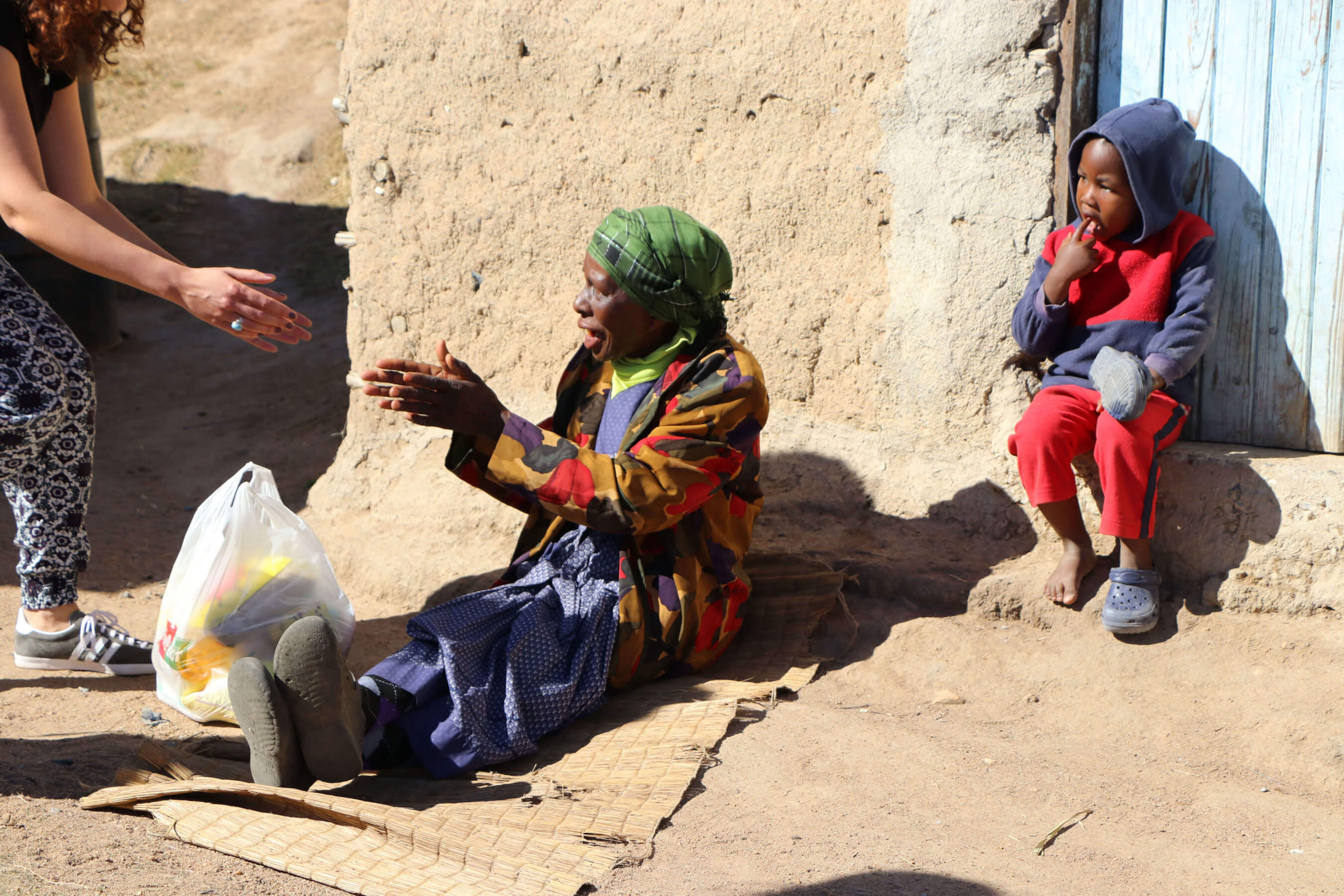
Your donation is only as good as the charity you give it to
Opinion + AnalysisBusiness + LeadershipHealth + Wellbeing
BY Sam Deere The Ethics Centre 21 JAN 2016
It’s admirable, perhaps even required, for those of us living comfortable lives in the developed world to give some time or money to ‘good causes’. We recognise fortune has smiled upon us and have a desire to ‘give back’ in some way – we have so much and others have so little, we seek to redress it.
But while there is strong agreement the fortunate have an opportunity – some would say an obligation – to use their resources to make life better for the less well-off, the discussion often ends here. That is, we think people should do something but we’re often not concerned with exactly what that something is. Should you donate to a local homeless shelter, a national medical research charity or a big international NGO? For many people, it’s unclear there’s any difference between these actions – surely they all make the world a better place?
Let’s think about that.
Say there were only two charities in the world, The Cupcake Foundation and the Real Actual Medicines Trust. The Cupcake Foundation distributes delicious cupcakes to people in hospital. The Real Actual Medicines Trust distributes medicines that will completely cure a patient’s disease. Both charities are undeniably making the world a better place but it’s pretty clear that one is doing much more good than the other. I think most people would choose to donate their money to The Real Actual Medicines Trust.
Asking these questions gets to the heart of why it is we help people. Are we altruistic because we think that making others better off is good in and of itself? Or do we just do it to stave off our middle-class guilt?
Take a different example. Let’s say that a third charity, Medicines ’R Us, is also distributing medicines, but they use generic medicines that cost half as much to produce as the on-brand medicines distributed by The Real Actual Medicines Trust. This means that a $20 donation to the Medicines ‘R Us will cure twice as many people as a $20 donation to the Real Actual Medicines Trust. Surely – given we can do twice as much good donating to the former than the latter – we should give our money to Medicines ‘R Us, thus doubling our impact.
These seem like contrived examples, but in reality, the differences between charities are astounding – not just a factor of two or three times, as in the example above, but some are ten, or even 100 times more effective than others!
Asking these questions gets to the heart of why it is we help people. Are we altruistic because we think that making others better off is good in and of itself? Or do we just do it to stave off our middle-class guilt? To impress other people? To show off?
Undoubtedly many good works are motivated by these latter factors. But are they really good reasons? Are they the reasons we’d choose? I’d certainly like to think that when I donate to charity I’m doing it for the benefit of other people. The sense of wellbeing that I get afterwards is nice but ultimately not morally important.
If it’s really other people’s benefit we care about, we need to think hard about how we choose where we spend our time and money on good causes. We don’t have infinite time and money. Every choice to donate something to one cause is an implicit choice not to donate it to another.
It might seem harsh to judge any charity less effective than any other another. Doesn’t that mean that the people served by the less-effective charity lose out? It does. But not making comparisons doesn’t mean everyone gets the help they need. It means that people who would be helped by the more effective charities lose out. More people are becoming sick, even dying, because people are choosing not to donate more effectively.
In the long run, hopefully we’ll be in a position to eradicate extreme poverty and disease from the world and we’ll have enough resources to fund all good causes. In the meantime, we should surely help as many people as we can.
Effective Altruism, a new social and philosophical movement is emerging to try to answer a fundamental question – “what is the most good that we can do?”
Effective altruism is about using evidence and reason to find ways to make the world as good a place as it can be. It tries to view all people – wherever they are in the world, even those not yet born – as being equally deserving of living happy, healthy, dignified, flourishing lives. Its proponents try to focus on the best ways of doing good. It’s just like regular altruism in that it seeks to do good for others. However, by focusing on effectiveness, it seeks to do the most good possible.
This manifests in different ways. Some people try to find the most effective charities to donate to, others try to work out which career you should choose if you want to have the biggest impact. Others think about the long-run future of humanity, reasoning that if there’s even a small chance that humans could wipe ourselves out (say, in a nuclear winter, or a deadly engineered disease escaping a laboratory), avoiding such an outcome would be a huge benefit.
It’s just like regular altruism in that it seeks to do good for others. However, by focusing on effectiveness, it seeks to do the most good possible.
Many also take a pledge to give a fixed portion of their income to effective charities – often 10 percent – because it increases the chance that they’ll actually donate, rather than putting it off for another day. In all these cases people are motivated by their sense of empathy but guided by scientific evidence and reason.
It may seem strange to think we might have an obligation to donate to one set of charities rather than others. After all, surely if someone wants to donate their money to a charity that focuses on people in their local community or on a cause that’s particularly important to them, they have that right. Of course, donation – unlike taxes – is an individual choice, not a legal obligation. But when faced with a choice of whether to help 100 people or just one, is it really a difficult decision?
Ethics in your inbox.
Get the latest inspiration, intelligence, events & more.
By signing up you agree to our privacy policy
You might be interested in…
Opinion + Analysis
Business + Leadership, Health + Wellbeing, Science + Technology
Can robots solve our aged care crisis?
Opinion + Analysis
Health + Wellbeing, Relationships
Why your new year’s resolution needs military ethics
Opinion + Analysis
Business + Leadership
Moral injury is a new test for employers
Opinion + Analysis
Health + Wellbeing, Business + Leadership
Teachers, moral injury and a cry for fierce compassion
BY The Ethics Centre
The Ethics Centre is a not-for-profit organisation developing innovative programs, services and experiences, designed to bring ethics to the centre of professional and personal life.
To live well, make peace with death

To live well, make peace with death
Opinion + AnalysisHealth + WellbeingRelationships
BY Matthew Beard The Ethics Centre 14 JAN 2016
“What do we say to the god of death?” swordsman Syrio Forel asks Arya Stark in George R.R. Martin’s Game of Thrones (and in HBO’s TV series). “Not today.”
This short refrain marks the beginning of a sustained exploration of humanity’s relationship with death told through Arya’s experiences. She becomes a murderer and later, in ‘The House of the Undying’ where death is seen as a god to be worshipped, an assassin and servant to that god.
Watching Arya’s story unfold, it seemed to me she’d never forgotten her former (you guessed it, now dead) teacher’s lesson – the only response to death is denial.
According to many thinkers, this isn’t surprising at all. Arya isn’t alone in running from death. Denying the reality of human mortality is a near universal behaviour. In The Antidote: Happiness for people who can’t stand positive thinking, Oliver Burkeman considers the writing of Ernest Becker, whose arguments Burkeman surmises. “Your life is one relentless attempt to avoid [thinking about death] – a struggle so elemental that … for much of the time you succeed.”
Becker believed to avoid confronting our mortality people invest in “immortality projects”. Art, family, business, nations, war, charity, and so on… Immortality projects aim to overcome physical death by ensuring our continued existence through symbols or ideas.
The late David Bowie promised “We can be heroes”, and that’s precisely Becker’s point. Immortality projects are attempts to become heroes, thereby avoiding the emptiness of death.
But research suggests the common instinct to avoid thinking about our mortality might be worth pushing against. In a paper entitled ‘Deliver us from Evil’, researchers found that mortality avoidance can cloud our judgements about life and death issues, leading to unreflective decisions in high-stakes situations.
The study asked two groups of people to undertake a long and generally dull questionnaire and then to read a short essay and tell researchers how strongly they agreed with it. The essay was a strong statement of support for the controversial policies of the Bush administration’s invasion of Iraq. It included lines like “It annoys me when I hear other people complain that President Bush is using his war against terrorism as a cover for instituting policies that, in the long run, will be detrimental to this country … Mr. Bush has been a source of strength and inspiration to us all. God bless him and God bless America”.
The only difference between the two groups was that one questionnaire forced subjects to consider their own mortality. The “mortality salience” group were asked to “briefly describe the emotions that the thought of your own death arouses in you” and to “jot down, as specifically as you can, what you think will happen to you as you physically die, and once you are physically dead”.
For some, even the idea of answering these questions might feel uncomfortable, as it did for the subjects in the experiment. Researchers found the “mortality salient” subjects invested more strongly in the nearest immortality project to hand – the war in Iraq. Subjects from the mortality salience group agreed strongly with the essay. By contrast, the control group generally disagreed with the essay’s sentiments.
When we’re forced to confront our own mortality, our default reaction may not be the product of rational thinking but an impulsive rejection of death.
This tells us something important – especially in a time when we are continually confronted with the threat and reality of terrorism and domestic violence nearly every day. When we’re forced to confront our own mortality our default reaction may not be the product of rational thinking but an impulsive rejection of death. The researchers argued similarly:
The fact that reminders of death and the events of 9/11 enhanced support for President Bush in the present studies may not bode well for the philosophical democratic ideal that political preferences are the result of rational choice based on an informed understanding of the relevant issues.
This poses a challenge for ethical behaviour – some of the most serious ethical decisions people face are made when they are confronted with death. Most obviously these include healthcare and political decisions with serious implications for the general populous. Is it possible to overcome mortality avoidance and make decisions based on moral values and principles instead?
Researchers weren’t optimistic on this point, but Burkeman indirectly suggests a way forward. His interest lay in whether thinking about death might enable us to live a happier life. He presents evidence that regular contemplation of death can enable us to avoid horror and shock when it ultimately arrives. “The more you become aware of life’s finitude, the more you will cherish it and the less likely you will be to fritter it away on distraction”.
The same might be true for our mortality avoidance in decision making. If regular acquaintance with death can remove some of its shocking strangeness, perhaps we will be less likely to invest in immortality projects as a way to distract ourselves from its reality. By making our peace with the fact we are all going to die, we will be less likely to make decisions based in our fear of death. If ‘Deliver us from Evil’ is any indication, this might also save lives in the long run by ensuring serious decisions are made reasonably and not from fear.
Plus, doing so might also make you happier.
Ethics in your inbox.
Get the latest inspiration, intelligence, events & more.
By signing up you agree to our privacy policy
You might be interested in…
Opinion + Analysis
Relationships
Come join the Circle of Chairs
Opinion + Analysis
Relationships, Society + Culture
The #MeToo debate – recommended reads
Opinion + Analysis
Health + Wellbeing, Relationships
Is it ok to visit someone in need during COVID-19?
Big thinker
Health + Wellbeing, Politics + Human Rights
Big Thinkers: Thomas Beauchamp & James Childress
BY Matthew Beard
Matt is a moral philosopher with a background in applied and military ethics. In 2016, Matt won the Australasian Association of Philosophy prize for media engagement. Formerly a fellow at The Ethics Centre, Matt is currently host on ABC’s Short & Curly podcast and the Vincent Fairfax Fellowship Program Director.
BY The Ethics Centre
The Ethics Centre is a not-for-profit organisation developing innovative programs, services and experiences, designed to bring ethics to the centre of professional and personal life.
Should parents tell kids the truth about Santa?

Should parents tell kids the truth about Santa?
Opinion + AnalysisHealth + WellbeingRelationships
BY David Kyle Johnson The Ethics Centre 15 DEC 2015
Kids, stop reading now – Santa’s watching!
Most adults know Santa Claus doesn’t exist. Yet most parents try to convince their children he does and try to keep them believing for as long as they can. They use bad evidence and ridiculous explanations to encourage kids to believe because it’s comforting or fun.
Is the Santa lie immoral? Does it teach poor critical thinking skills? Perhaps, but let’s put the philosophical questions aside.
As a parent, I have other concerns. Is the fact that children thank Santa and not their parents for their gifts problematic? Should Santa be used as a disciplinary threat? Does it really encourage imagination? Does lying to my child about Santa threaten my child’s view of how trustworthy I am? All in all, is lying to children about Santa good parenting practice?
I don’t think it is. It’s not that I’d be a bad parent if I did lie to my children about Santa. I’d be a better parent if I didn’t. Here’s why.
Children who believe in Santa thank him for their presents instead of their parents. It might seem selfish for a parent to desire such appreciation, but children need to learn to give it. What’s more, making your child believe the gifts you buy them come from someone else defeats the primary function of gift giving. As a theologian recently reminded me, gifts are the giver’s way of showing the recipient that he or she has worth and is loved. Children need assurance their parents see them as worthwhile and valuable – not Santa Claus.
And as even defenders of the Santa lie agree, Santa shouldn’t be used as a disciplinary threat. “Though lying [about Santa] can be an awfully convenient parenting crutch… it’s generally best to keep it to a minimum.” Yet that’s exactly how many parents use the Santa lie.
I don’t give out bonus points to my students for attending class. Why should we reward children for a mere lack of misbehaviour?
It’s perfectly acceptable to train children to do the right thing by rewarding good behaviour and punishing the bad – but the Santa lie doesn’t do this. It promises lavish reward for a simple lack of misbehaviour.
“Stop hitting your sister or Santa won’t bring you anything.”
I don’t give out bonus points to my students for attending class. Why should we reward children for a mere lack of misbehaviour?
In addition, lying about Santa doesn’t encourage imagination – it stifles it. You can’t pretend something is true if you already believe it is. As Pascal-Emmanuel Gobry puts it, “If believing in Santa was an exercise in imagination, every kid would believe in a different Santa.” By tricking children into actually believing Santa exists we rob them of the opportunity to imagine he does.
Consider how one mother who emailed me approaches Christmas with her children:
“We have ‘played the Christmas game’ with [our children] every year. My husband and I purchase the gifts and wrap them in secret, and we place them under the tree on Christmas Eve when the kids are asleep. We talk about Santa coming and what he’ll bring… Heck, we even have an Elf on the Shelf that the kids adore. We try to think of different (crazy!) ways that Santa and the Elf come into the house, or cover the whole world in one night.
Maybe they have a spaceship? Maybe Santa multiplies? … We visit Santa at malls and the kids just LOVE telling him what they want for Christmas. But the kids know the truth 100%. That is very important for us. They know it just like my husband and I do, they just enjoy PRETENDING that they don’t. As my daughter, who’s 7, said “I know Santa isn’t real but I like believing in him.”
To encourage imagination, we should pretend along with them – suspending our disbelief while also being aware the story we’re telling is imaginary. It is possible to merge both truth and storytelling as a parent.
My final worry is simple – trust. Finding out their parents have lied to them about Santa Claus can cause children to think their parents are lying to them about a great many other things. Not always, of course, but some children are more susceptible than others. It’s perhaps even more of a risk than many parents realise.
I’ve collected countless stories about the moment children learn the truth. Many were not only embarrassed or outright livid, but actually began to distrust their parents. Recently, one man told me the moment he realised his parents had lied about Santa was also the moment he concluded they must have been lying to him about Jesus and God. He’s an atheist still today.
To encourage imagination, we should pretend along with them. It is possible to merge both truth and storytelling as a parent.
In reality, the tradition of tricking children into believing Santa literally exists is only about 200 years old. It was popularised after the idea that St Nicholas breaks into the house while the children are asleep to deliver presents was invented by Clement Clarke Moore’s poem A Visit from St. Nicholas in 1823. It did not describe an already existing tradition.
The idea was sold to us by rich New Yorkers and business for various reasons – mainly financial – but I think it’s high time that we gave it up. It’s not that we should eliminate the Santa myth from our Christmas traditions entirely, but tricking our children into literally believing Santa actually exists needs to stop. Not only is it bad parenting, but as many parents who avoid the lie have made clear to me, it is in no way necessary for holiday fun or Christmas magic.
Ethics in your inbox.
Get the latest inspiration, intelligence, events & more.
By signing up you agree to our privacy policy
You might be interested in…
Opinion + Analysis
Business + Leadership, Relationships
Can you incentivise ethical behaviour?
WATCH
Relationships
What is the difference between ethics, morality and the law?
Opinion + Analysis
Relationships, Society + Culture
Five dangerous ideas to ponder over the break
Explainer
Relationships
Ethics Explainer: Negativity bias
BY David Kyle Johnson
David Kyle Johnson is an associate professor of philosophy at King’s College, Pennsylvania. He is author of The Myths that Stole Christmas: Seven Misconceptions that Hijacked the Holiday (and How We Can Take It Back).
BY The Ethics Centre
The Ethics Centre is a not-for-profit organisation developing innovative programs, services and experiences, designed to bring ethics to the centre of professional and personal life.
Feminist porn stars debunked

Feminist porn stars debunked
Opinion + AnalysisHealth + WellbeingPolitics + Human Rights
BY Laura McNally The Ethics Centre 9 DEC 2015
So-called feminist porn star James Deen has faced shocking accusations of rape from numerous women, including several female porn actors.
If true, it’s crucial Deen and men like him are held to account. But it’s also vital that porn producers, wholesalers, web hosts, and investors are not given a free pass. The porn industry deserves critique for feigning interest in respectful consensual sex while creating and profiting from its opposite – and doing so under the banner of feminism and ethics.
The porn industry is starting to brand itself as educational and ethical. The likes of Playboy are dedicating column inches to feminism, porn sites are handing out college scholarships and entire genres of porn are being dedicated to feminism.
“Feminist porn” is frequently cited as a solution, despite its limited popularity. Should it give us hope for a future of ethical porn? Recent events suggest not.
Deen’s ex-partner Stoya says he coerced her and pinned her down despite her pleas to stop. Her claims were followed by those of several other women alleging Deen had punched, injured, assaulted or anally raped them either on or off set. According to one:
He starts going crazy … extreme, brutally … He just starts shoving things in to the point where he ripped it [her rectum] and I bled everywhere. There was so much blood I couldn’t finish the scene.
Deen brands himself “a guy who bangs chicks for a living”. He features in numerous titles such as Teenaged Whores 5 and Triple Penetrated in Brutal Gangbang. Deen frequently appears on rough sex sites. He is also viewed as a “male feminist” by supporters.
But the accusations paint a different picture – of dangerous, misogynist ideals that hardly seem out of place in the thinly veiled “ethical” porn industry.
The popular notion that porn is mere fantasy with no link to real-world behaviour is challenged by the suggestion some of Deen’s ‘frape’ (fantasy rape) scenes may have been genuine rape on film. Moreover, it is alleged many of the porn crew were aware these acts were rape and congratulated Deen for getting anal scenes when they hadn’t been consented to.
These rape accusations make it clear pornography is not mere fantasy. Some may be footage of sexual violence and it has real negative effects for producers and consumers.
Yet, those harms are frequently denied. Such was the case when the ABC aired Australians on Porn. A Gold Coast Sexual Assault Centre Director was quoted on porn’s link to sexual violence:
“The biggest common denominator of the increase of intimate partner rape of women between 14 and 80 is the consumption of porn by the offender … We have seen a huge increase in deprivation of liberty, physical injuries, torture, drugging, sharing photos and film without consent and deprivation of liberty.”
This evidence was dismissed as “irrelevant” by some on the panel – the majority of whom were porn users and supporters. Porn, they suggested, isn’t to blame for negatively shaping behaviours. Rather, it opens minds and provides new ideas for the bedroom.
This argument sharply contrasts with police views and consistent research regarding the harmful effects of pornography. Studies backed by numerous meta-analysis show attitudes toward gender equality, sexual aggression and rape acceptance are worse for viewers of pornography.
The question is not whether a man can be feminist and a porn actor, but why an industry that promotes sexual violence and rape porn is regarded as ethical at all.
Young women are increasingly at risk. Forty percent of UK teenage girls report experiencing coerced sex acts and 25 percent report pressure to send pornographic texts. The ABC’s panel failed to include any person who could speak to the effect of porn in normalising harassing behaviours, sexual coercion, non-consensual filming or sexual violence. Nor did the panel give a flicker of thought to those harmed in production, or the girls, women and men who have quit on account of physical or emotional injury due to trends toward rough sex, choking and facial abuse.
After dismissing concerns about porn, the panel swiftly refocused on the positive effects of ethical and feminist porn before cutting to air a porn scene.
The ABC panel exemplified the dismissal of social harms with tokenistic stories of good. Those invested in porn are not unique from other industries in derailing critical dialogue with a perfunctory nod toward ethics.
These cynical displays of ethics are also used to gain greater political reach. Porn as sex education was recommended by some among the panel. James Deen regularly penned sex advice columns for mainstream feminist publications.
The question is not whether a man can be feminist and a porn actor, but why an industry that promotes sexual violence and rape porn is regarded as ethical at all. What of the ethical considerations stemming from the millions masturbating to scenes of sexual violence on film?
An industry that contributes to and profits from rape culture is an unlikely ally for gender equality.
Ethics in your inbox.
Get the latest inspiration, intelligence, events & more.
By signing up you agree to our privacy policy
You might be interested in…
Opinion + Analysis
Business + Leadership, Politics + Human Rights
A foot in the door: The ethics of internships
Opinion + Analysis
Politics + Human Rights
Orphanage ‘voluntourism’ makes school students complicit in abuse
Opinion + Analysis
Health + Wellbeing, Relationships
Ageing well is the elephant in the room when it comes to aged care
Opinion + Analysis
Business + Leadership, Politics + Human Rights
Who’s afraid of the strongman?
BY Laura McNally
Laura McNally is a psychologist, author and PhD candidate researching the political implications of corporate social responsibility. She is the chair of the Australian branch of Endangered Bodies.
BY The Ethics Centre
The Ethics Centre is a not-for-profit organisation developing innovative programs, services and experiences, designed to bring ethics to the centre of professional and personal life.
Stopping domestic violence means rethinking masculinity

Stopping domestic violence means rethinking masculinity
Opinion + AnalysisRelationships
BY Michael Salter The Ethics Centre 25 NOV 2015
What does it mean to be a non-violent male in Australia?
If we were honest, we would admit that it means being a ‘wimp’ – or worse, a ‘poofter’. For many young Australian boys, that’s what you get called if you don’t punch the guy that punched you, or if you don’t want to spend your Saturdays tackling others into muddy grass.
Boys and men are expected to show some capacity for violence. Aggression is understood to be part of what makes us male, and we celebrate it as a matter of national pride in both sport and war. Eschewing violence calls our masculinity into question. In some contexts, it’s downright dangerous to be non-violent since it signals weakness and invites retaliation from others.
To prevent violence against women, authorities have been anxious to assure us we can be “real men” without hitting women. Prevention campaigns present us with men defined by the stereotypically masculine attributes of success (strength, money, power) who say they don’t hit women.
The message is clear. Keep our tough, competitive masculinity but abandon gendered violence.
By characterising non-violence as the mere absence of violence, prevention campaigns struggle to articulate a constructive agenda that provides men and boys with strategies they can use to actually prevent violence.
We are regularly called on to “stand up”, “man up” or “speak out” against sexism and misogyny. In practice, it’s not clear what this actually means or how it is going to reduce endemic levels of violence against women. At its worst, it sounds like grandstanding.
The call to “take the oath” not to commit violence against women is largely a symbolic stand. Almost every man that abuses his spouse has at some time promised to stop.
But if that promise had the power to prevent violence against women, we wouldn’t have this problem.
Non-violence is not simply the absence of violence. Non-violence is the presence of characteristics that oppose violence, such as care, patience or compassion. Just as violence expresses a failure of empathy, non-violence involves a wealth of practices that reflect the views of others as deeply important and valuable.
We don’t need to compensate men and boys for the “loss” of violence with reassurances about their masculinity. Instead we need to validate non-violence as a legitimate choice for men and boys and demonstrate how it can be enacted in everyday life.
This framing of non-violence as an active accomplishment is drawn from the pacifist philosophies evident in strains of Buddhist, Hindu, and Christian thought, for example. It is exemplified by the figures of Martin Luther King Jr., Mahatma Gandhi and Nelson Mandela. In these traditions non-violence is a skill developed over time. It actively builds relations and communities founded on mutual care in which violence cannot take root.
Rather than idolising “real men” who don’t hit women, prevention campaigns could be valuing the other kinds of choices boys and men make, such as caring for others, supporting those in need and working for the collective good. These actions not only oppose violence but they repair the damage that violence causes and transform social conditions to make violence less likely.
Non-violence offers men and boys what they are really looking for – a sense of purpose and a place in communities they have worked to build and foster. By contrast, those men who have pursued aggression to its inevitable end are often left grieving for the loss of relationships with their children, partners and families. In this way, violence harms those who commit it as well as those it is directed against.
The wish to care and be cared for is the very foundation of non-violence and, potentially, the beginning of a different way for violent men. We can show them how to put that wish into practice until they too can experience genuine mutuality and connection with others rather than shaming them as “unmanly” or irrevocably tainted. Care, patience and compassion are modes of being that can be taught and nurtured over time. Practically, we may need to restrain violent men to protect others but that doesn’t abrogate their potential for change.
Non-violence is not passivity or inaction. It’s the choice to oppose violence by engaging with others and working towards their wellbeing and safety. There are countless men living dignified and non-violent lives all around Australia in many different ways. Through their care for others and their preparedness to put this care into practice, non-violent men generate rewarding relationships and contexts of non-violence, usually in close partnership with women. They don’t need or demand their masculinity to be validated in the process. A non-violent life is a meaningful one and its own reward.
The question is whether we as a society really value these men or the path of non-violence they have followed. If we do, then it’s about time we map that path out and show other men and boys how to follow it.
Ethics in your inbox.
Get the latest inspiration, intelligence, events & more.
By signing up you agree to our privacy policy
You might be interested in…
Opinion + Analysis
Politics + Human Rights, Relationships, Society + Culture
You won’t be able to tell whether Depp or Heard are lying by watching their faces
Opinion + Analysis
Relationships
Ask an ethicist: How much should politics influence my dating decisions?
Opinion + Analysis
Health + Wellbeing, Relationships
Australia’s paid parental leave reform is only one step in addressing gender-based disadvantage
WATCH
Relationships
Moral intuition and ethical judgement
BY Michael Salter
Scientia Fellow and Associate Professor of Criminology UNSW. Board of Directors ISSTD. Specialises in complex trauma & organisedabuse.com
BY The Ethics Centre
The Ethics Centre is a not-for-profit organisation developing innovative programs, services and experiences, designed to bring ethics to the centre of professional and personal life.
Is your workplace turning into a cult?

Is your workplace turning into a cult?
Opinion + AnalysisBusiness + LeadershipHealth + Wellbeing
BY Petrina Coventry The Ethics Centre 24 NOV 2015
If every culture has a little bit of cult in it, how do we know when there is risk of the line being crossed? There are a few signals worth keeping an eye on.
Good news cultures
Does everything seem a little bit too wonderful? Do you feel as though people are insisting that you accept how wonderful the organisation is? Good news culture can sometimes hide behind the guise of good PR – a glossy front, shiny happy people adorned in corporately branded t-shirts and caps.
If you sense that questioning, doubt, or dissent is discouraged or even punished for fear of undermining the morale or image of the organisation, a good news culture could be at play.
Dominant logic
Ever heard of groupthink? Cults and organisations alike can generate a uniform way of thinking and communicating featuring jargon and particular decision-making processes. If your organisation’s meetings and strategic documents are full of jargon, or alternative approaches from employees are rejected with statements like, “it’s not the way we do things here”, you might be crossing the line into cultish culture.
Elitism
Organisations that claim special, exalted status can generate polarising us-versus-them thinking. This in turn can pit the organisation against the wider community and divorce organisational values from those of the broader community. Many organisations claim to “only recruit the best”, but when “the best” happen to emulate and follow the rules or standards of the group it should be considered a warning sign.
‘Dear Leader’ syndrome
‘Dear Leaders’ can create elitism and intimacy among followers, allowing access only to those with unquestioning commitment to their belief system and ideology. Ask yourself who has access to the leader – are dissenting voices allowed, or only ‘yes’ men and women?
They often hold conflicting standards – the rules for followers do not apply to the leader.
When the polished charismatic face of an organisation has an internal following full of devotion to their ideas or ideology, it may be time to be concerned.
These leaders may claim new methods of wealth creation, life success or social influence. Their new solutions or ideology may appear able to solve serious and previously insurmountable problems.
They direct attention towards themselves while feigning humility. In doing so, they create dependency and obedience within an organisation by ensuring the wellbeing of the members is tied to their own wellbeing.
When the polished charismatic face of an organisation has an internal following full of devotion to their ideas or ideology, it may be time to be concerned. They can make it impossible to build a consistent ethical culture within the organisation.
Devotional blindness
Do your colleagues seem unusually committed to their ‘Dear Leader’, their ideology, role, status or wealth? Is worship or adoration being generated for the leader and close followers? Does the organisation seem to be venerated in an unusually fervent way? Devotion and adoration can override decisions people would otherwise make in their life. Blind subservience to the leader, group or ideology in cults can radically alter personal goals and commitments an individual had before joining.
Cults expect members to devote inordinate amounts of time to the group and group-related activities at the expense of self-identify or ties with family and friends. They forget their non-group identity and may fear reprisals if they consider leaving the group.
Ideology and exalted ends
When zealous attainment of what seems like an extraordinary goal seems prevalent, be concerned. Zeal for greater profit margins and work success can lead leaders and employees alike to rationalise unethical or ill-considered methods.
Zeal for greater profit margins and work success can lead leaders and employees alike to rationalise unethical or ill-considered methods.
Be sceptical of work cultures that drive debilitating schedules or tolerate sleep deprivation and employee burnout. Exaggerated ambitions or an exclusively achievement-oriented culture should also be viewed carefully. Do not tolerate leaders who justify the means only by whether they achieve stipulated goals.
Scapegoating and marginalisation
Most cults rely on intimidation to maintain their organisational identity. They use humiliation and blame to control their members, often through peer pressure and subtle forms of persuasion. When dissent or criticism is not permitted and individuals are marginalised or excluded from decision-making, you have problems.
Fortressing
Be concerned when transparency is admonished or there is widespread fear that rival people or groups are aiming to undermine the organisation. A simple measure of this is the overuse or abuse of confidentiality agreements. The ability for individuals to discuss their business should only be restricted with good reason. Paranoia and secrecy should not undermine professional transparency.
Does any of this sound familiar? You can find examples of any of these situations in organisations at any time. The real danger is when you find recurring clusters of the signals. If you do spot clusters, don’t despair – many organisational cultures have been redeemed by taking a few simple steps.
Click here to learn about the steps you can take to improve your business culture.
Are you currently dealing with an ethical dilemma? A conversation with an objective, independent person can really help. Call Ethi-call, our confidential ethics helpline, on 1800 672 303 for free anywhere in Australia.
Ethics in your inbox.
Get the latest inspiration, intelligence, events & more.
By signing up you agree to our privacy policy
You might be interested in…
Opinion + Analysis
Business + Leadership
Are diversity and inclusion the bedrock of a sound culture?
Opinion + Analysis
Business + Leadership
Is it fair to expect Australian banks to reimburse us if we’ve been scammed?
Opinion + Analysis
Health + Wellbeing, Relationships
Seven COVID-friendly activities to slow the stress response
Opinion + Analysis
Business + Leadership
Survivor bias: Is hardship the only way to show dedication?
BY Petrina Coventry
Petrina Coventry is Industry Professor and Director of Development with the University of Adelaide Faculty of the Professions and the Business School. She previously held global vice president roles with the General Electric Company and The Coca Cola Company in the United States and Asia and was most recently CHRO with Santos Ltd.
BY The Ethics Centre
The Ethics Centre is a not-for-profit organisation developing innovative programs, services and experiences, designed to bring ethics to the centre of professional and personal life.
Praying for Paris doesn’t make you racist

Praying for Paris doesn’t make you racist
Opinion + AnalysisRelationships
BY Matthew Beard The Ethics Centre 17 NOV 2015
It is not Paris we should pray for. It is the world.
Those are the opening lines of a poem by Karuna Ezara Parikh, a poet from New Delhi, whose poem went viral after terrorism attacks in Paris, Beirut, and Baghdad.
The poem reflects a growing tradition in which people’s personal responses to tragic events is subjected to moral scrutiny. In response to online movements of solidarity such as #Prayers4Paris and #JeSuisParis emerged #PrayfortheEntireWorld and#PrayforLebanon.
These response movements censure those whose concerns about global terrorism are limited to Paris. At best they charge people with insensitivity, at worst outright racism. And not without some cause. Facebook, for instance, have not enabled a filter to show solidarity with Lebanon – nor was the Safety Check feature enabled for those in Beirut as it was for those in Paris.
It prompted New Matilda to ask (or perhaps more accurately, accuse):
How do we explain our identification with French suffering and our apparent indifference to Lebanese suffering? Or more to the point, how do we explain our indifference to the suffering of people we perceive as different, Lebanese, African, Hazara, Muslim … Brown people.
I’ve been thinking about Paris more than I have Beirut. I don’t believe that makes me racist, indifferent, or insensitive.
I have not prioritised some victims of terrorism over others. Victims of murder are always and everywhere the victims of one of humanity’s deepest horrors – their very right to life has been torn away. In this tragedy, they are all equals.
Those who ISIS murdered in Beirut are no more or less important than those in Paris. Or in Mosul, Baghdad, or anywhere else for that matter – not ethically, nor to me personally. But it doesn’t follow from this that I ought to allocate equal sorrow, grief or reflection to each incident.
It may not even be possible.
Scottish philosopher David Hume believed morality was based in sympathy – the ability to understand and share in the experiences of another person. Morally good people are, Hume argued, pleased when someone experiences something good and saddened when someone else suffers.
But all of this is grounded in our ability to know and understand how another person is feeling. We are more readily able to imagine and thereby sympathise with the familiar. We are better at knowing how our family feel than we are a total stranger.
I’ve been to Paris – I’ve walked the streets, smelled the air, and been among its people. I was there on my honeymoon. My wife and I dined in restaurants, drank in bars, and wandered the streets around Rue de Voltaire – just like those who were slaughtered last Friday.
ISIS didn’t just attack today’s Paris. They attacked the Paris of Les Misérables, A Tale of Two Cities, and Hemingway.
When my heart breaks for Paris it breaks because I know the streets that are stained with blood more intimately than I do the markets of Beirut or the mosques of Baghdad. Others whose heritage, reading or travels are different may connect more with Baghdad or Beirut. Or Japan, Mexico or any of the countless places in the world where innocent people suffer.
Of course, not everyone mourning for or expressing solidarity with Paris has visited France before. Perhaps the charge of racism still applies. Do Westerners more readily empathise with the experience of white people? Not necessarily.
Paris has always held a special place in the Western imagination. It sits alongside Rome and Athens as definitive of Europe and the West. This is precisely why ISIS chose it as a target. Terrorism speaks in symbols, and Paris is precisely that. ISIS called it the “capital of prostitution and obscenity” but Paris is more than that – it’s an icon of Western secularism, humanism and indeed, decadence.
ISIS didn’t just attack today’s Paris. They attacked the Paris of Les Miserables, A Tale of Two Cities and Hemingway. Put simply, Paris was attacked because it matters more than most other places to the West. Terrorism aims to hit our imaginations, so ISIS struck a city that captures it more than most.
The other reason Paris strikes us more deeply is because it brings the threat of terrorism closer to home. Although every Western nation has been exposed to Islamic extremism in its own way, we continue to believe attacks on our own soil to be the unlikely exception. Statistically, they are, but attacks in places such as Boston, Paris, or New York make the risks of terrorism tangible in a way similar attacks in Baghdad, Beirut, or Nigeria do not.
This is because Western nations have, since the Enlightenment, eschewed the type of ideological extremism that generates the violence that defines ISIS and other groups. We have led ourselves to believe religiously motivated violence is an artefact of history in secular societies. In other parts of the world where the norms of secularism don’t apply, we understand such violence to be possible – but not here.
Western nations have, since the Enlightenment, eschewed the type of ideological extremism that generates the violence that defines ISIS and other groups.
Thus we are not only shocked or sorrowed by attacks in Paris, we are afraid. And so we counteract our fear with movements of solidarity, resolve and a reaffirmation of our values. That’s not racism.
With all that said, it is right that people remind us of horrors elsewhere in the world. By expanding our imaginative faculties we can overcome the xenophobia and tribalism on which groups like ISIS rely.
So take a moment for Beirut, for Baghdad – mourn their dead. Think more of those places than Paris if it’s where your thoughts, prayers or heart lies. But don’t shame those who still think of Paris, and don’t feel guilty if you feel the same.
Ethics in your inbox.
Get the latest inspiration, intelligence, events & more.
By signing up you agree to our privacy policy
You might be interested in…
Big thinker
Politics + Human Rights, Relationships
Big Thinker: Adam Smith
Opinion + Analysis
Relationships
“I’m sorry *if* I offended you”: How to apologise better in an emotionally avoidant world
Opinion + Analysis
Relationships
It takes a village to raise resilience
Opinion + Analysis
Health + Wellbeing, Relationships
Ask me tell me: Why women think it’s ok to lie about contraception
BY Matthew Beard
Matt is a moral philosopher with a background in applied and military ethics. In 2016, Matt won the Australasian Association of Philosophy prize for media engagement. Formerly a fellow at The Ethics Centre, Matt is currently host on ABC’s Short & Curly podcast and the Vincent Fairfax Fellowship Program Director.
BY The Ethics Centre
The Ethics Centre is a not-for-profit organisation developing innovative programs, services and experiences, designed to bring ethics to the centre of professional and personal life.
Germaine Greer is wrong about trans women and she’s fuelling the patriarchy

Germaine Greer is wrong about trans women and she’s fuelling the patriarchy
Opinion + AnalysisHealth + WellbeingRelationships
BY Helen Boyd The Ethics Centre 9 NOV 2015
I’ve been doing work with and for trans women for about 15 years now. And the thing I tell most audiences at the outset is this – once you know one trans person, you know one trans person. That is all you know.
Germaine Greer has met a few trans women and she has made a decision about all trans women. She has decided that trans women are not women.
I am going to give her the benefit of the doubt and assume she is not making such a sweeping statement based on personal and anecdotal evidence. This leaves only biology and theory as ways to determine what defines a woman.
Let’s start with biology.
I believe trans women are not just women, they are female. This is a hang-up on the part of many feminists who are still stuck in some world where biology is destiny. Because if ‘woman’, as de Beauvoir argued, is a social construct, we become women by living as women in the world, by facing oppression based on gender. For some women, that social conditioning starts with birth because of a vagina and a doctor’s declaration. For others, it starts at 15, 45, 75…
There is nothing feminist about asserting the rights of the oppressors over the dignity and value of the oppressed.
Trans women are aware they are female and are meant to have bodies that allow others to gender them correctly. Harry Benjamin, a pioneer in trans issues, saw attempts to change the minds of transgendered people as not only futile but un-Hippocratic. Changing minds caused unnecessarily suffering. So he designed a way to change bodies.
Definitions of sex are based on very little – chromosomes and hormone dominance. The combination of those two is what creates a sexed body, but we also know that bodies with vaginas sometimes come with XY chromosomes and vice versa.
We also really have no idea what part of the brain “tells” us our sex. Mostly, for those of us who are not trans, we never face a disruption between our bodies/glands/hormones and the way we are socialized. Trans people do. Some experience a crippling, brutal disruption. They experience gendered oppression both internally and externally.
Which is all my way of saying ‘female’, like ‘woman’, is an unstable category. Its very definition is changes based on what we know about bodies, chromosomes, hormones, foetal development, and particularly brain sex.
So we turn to theory for a definition of woman instead.
As a feminist my compassion is with those who experience gendered oppression of any kind. My intersectional feminism recognises all women experience gendered oppression in different ways. For black women, gendered oppression is racialized. For poor women, gendered oppression is classed. For trans women, gendered oppression is transphobic.
I don’t know how Germaine Greer missed out on 30+ years of gender theory, positing that woman is a stable, universal and identifiable category. It hasn’t been for a very long time. I also don’t know how she can be any kind of post-structural feminist and not acknowledge that socialization is what makes a woman a woman.
I don’t know of a group of women right now who are more restricted or oppressed by someone else’s definition of ‘woman’ than trans women.
And I don’t know of a group of women right now who are more restricted or oppressed by someone else’s definition of ‘woman’ than trans women (except, of course, black women and lesbians and childfree women and post-menopausal women). ‘Woman’ is, after all, a category of patriarchy’s making.
It pains me to see a feminist borrow tools from the master’s toolbox and call them liberation.
Germaine Greer is wrong. She carries a greater resonance and burden because we expect such remarkable feminism and knowledge from her. She is not dismissible or stupid, but she is still wrong. Everything I know as a feminist is built on inclusion. ‘Woman’ is an alliance, not an identity you choose. It is the sum of all of the parts of what it is to live in a patriarchy and to feel no power and a tremendous threat of violence if you don’t follow the rules.
If there is anyone in the world who is experiencing those things right now, it is trans women. She is not just upsetting people by saying what she says. She is giving those who hate trans women permission to make their lives more miserable. And there is nothing feminist about asserting the rights of the oppressors over the dignity and value of the oppressed.
Her stance is not just harmful and illogical but more than anything else it seems spiteful, exclusive, and lacking in compassion. It is not my feminism, and no feminist worth her salt would exclude other women based on how good or how bad they are at being women. And she is doing exactly that.
Read a different take on trans women and Germaine Greer here, by Aoife Assumpta Hart.
Ethics in your inbox.
Get the latest inspiration, intelligence, events & more.
By signing up you agree to our privacy policy
You might be interested in…
Big thinker
Politics + Human Rights, Relationships
Big Thinker: Adam Smith
Opinion + Analysis
Health + Wellbeing
Democracy is hidden in the data
Big thinker
Relationships, Society + Culture
9 LGBTQIA+ big thinkers you should know about
Opinion + Analysis
Relationships
Why we find conformity so despairing
BY Helen Boyd
Helen Boyd is the author of My Husband Betty and She’s Not the Man I Married: My Life with a Transgender Husband.
BY The Ethics Centre
The Ethics Centre is a not-for-profit organisation developing innovative programs, services and experiences, designed to bring ethics to the centre of professional and personal life.
Maggie Beer: Good food can drive better aged care

Maggie Beer: Good food can drive better aged care
Opinion + AnalysisHealth + Wellbeing
BY Matthew Beard The Ethics Centre 6 NOV 2015
Cooking guru Maggie Beer has turned her culinary prowess to the considerable task of dishing up better food for the elderly, whether they’re living at home or in aged care. With her team at the Maggie Beer Foundation, she’s coordinating a movement that will bring the healing power of food to those who need it.
“We want to give them the energy to create mobility… So many people in the industry are working so hard often without the support, without the newest thinking or ideas, without the specialised training and without being valued,” Beer explains.
Loneliness and hopelessness can be a challenge to good nutrition. The elderly – especially the bereaved – can struggle to rationalise the effort and expense of cooking for themselves. Not only is it demanding on time and energy, it can be a reminder of loss.
It’s not surprising frozen meals and food delivery services become attractive. But this brings us back to nutrition. “So many of them are ordering Lite n’ Easy!” Beer bemoans. “Nutritionally, it’s the exact opposite of what they need”, which is, among other things, full-fat meals high in protein and calcium.
Better food and better food communities represent a solution. Taking a meal is a traditionally communal enterprise that nourishes the body and the soul.
“Loneliness is a huge thing so we’re trying to bring people together – even once a month – to share a meal and be part of a wider community,” says Beer.
Passion also plays a part. Beer is in the business of cultural change and she wants a passion for food to be part of the solution.
She hopes for “a kitchen culture [in aged care] where chefs and kitchenhands are proud of the food that’s being produced.” This pride in creating beautiful food trickles outward. It creates more energetic residents, but also reveals to staff the therapeutic power of pleasure.
“It makes them [the staff] proud and celebrates those providing the food,” she explains.
Beer is battling against those who allow the elderly merely to exist rather than live a full, enriching life. So is the problem with food in aged care a symptom of the broader social malady – our collective attitudes to ageing?
“It’s endemic”, says Beer. “We need to find those industry leaders who don’t have the preconceived notion that the elderly can be cared for without soul… I want to create a sense of outrage about [elderly people] who are merely existing.”
Cultural change is important to improve conditions for those in aged care right now. Beer is less concerned about the next generation of elderly.
“Baby Boomers have been making changes all their life – they won’t accept the status quo. But people need help and support now. They’ve lived hard lives and not complained. Now they need to feel valued.”
Beer is no slouch on the pragmatics of cultural change. Her strategy could have been pulled straight from Aristotle who believed ethical role models were necessary for good education. Beer is looking for examples of industry best practice to serve as benchmarks for others.
Using these benchmarks successfully will require leaders who are open to improvement – and a recommitment to the industry values that inform aged care.
“If you have a leader who knows how much good food can give to the resident pleasure and wellbeing, [it creates] a totally different attitude to those who see it as a means of keeping people alive… By finding the great examples, celebrating them and using them as benchmarks, there is so much we can do,” she says.
There are a number of such leaders around. Off the cuff Beer lists a range of projects she knows of or is involved with. From architecture to linguistics and gardening, progress is being made.
It isn’t just about changing the system, but each individual’s attitudes to include the elderly as part of the community. In that spirit, I ask Beer for three dishes every grandchild should be able to cook for their grandparents.
“It should be nutritious, but with lots of flavour and nostalgia”, she says. “Shepherd’s pie, a chicken soup with lots of vegies, and bread-and-butter pudding full of eggs, custard, and cream.”
The German philosopher Ludwig Feuerbach quipped, “philosophers have broken their heads over the question of the bond between body and soul. Now we know… eating and drinking hold together body and soul, that the searched-for bond is nutrition.”
He seems to have found his muse.
Ethics in your inbox.
Get the latest inspiration, intelligence, events & more.
By signing up you agree to our privacy policy
You might be interested in…
Opinion + Analysis
Health + Wellbeing, Relationships
How to pick a good friend
Opinion + Analysis
Business + Leadership, Health + Wellbeing
Tips on how to find meaningful work
Opinion + Analysis
Health + Wellbeing, Relationships
Should you celebrate Christmas if you’re not religious?
Opinion + Analysis
Health + Wellbeing
